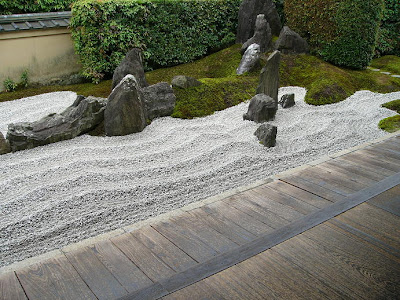*
*
.JPG)
.JPG)
.JPG) if i visited kyoto this week i would escape from the crowd to my favourite zen temple complexes of daitokuji or tofukiji, instead. they offer anyone who loves tranquillity an urban retreat. daitokuji is the original place where the art of tea was formed and performed by sen no rikyu so that you can imagine how the secluded location and sacred environment were played as elements to its birth. i can tell that there are fewer people who fancy visiting either of them in summer, when kyoto becomes like a hot pan on a hob, than other seasons. usually, zen temple complex consists of several sub-temples that boast their respective 枯山水(karesansui): dry rock and stone gardens. and two of my favourite zen gardens were built by late mirei shigemori, the artist-turned-garden-architect, for daitokuji and tofukuji. the gardens, of which designs are pretty unsusual, were his abstract expression of modern art, as it were.
if i visited kyoto this week i would escape from the crowd to my favourite zen temple complexes of daitokuji or tofukiji, instead. they offer anyone who loves tranquillity an urban retreat. daitokuji is the original place where the art of tea was formed and performed by sen no rikyu so that you can imagine how the secluded location and sacred environment were played as elements to its birth. i can tell that there are fewer people who fancy visiting either of them in summer, when kyoto becomes like a hot pan on a hob, than other seasons. usually, zen temple complex consists of several sub-temples that boast their respective 枯山水(karesansui): dry rock and stone gardens. and two of my favourite zen gardens were built by late mirei shigemori, the artist-turned-garden-architect, for daitokuji and tofukuji. the gardens, of which designs are pretty unsusual, were his abstract expression of modern art, as it were.
*
in the meantime, whenever i visit a white cube to view some contemporary artwork, i’d feel as if i view a zen garden. between 枯山水 and minimalist work, in a broad sense, such as richard sera’s, anish kapooa’s and rothko’s in particular, i’ve found something in common. the magical ingredients of esotericism in both cases are beauty, simplicity, frugality, austereness and meditativeness that inevitably involves spectator’s state of mind within existing space and time. and I've also found a good thing about aging. that is, i have grown up enough to appreciate its ‘less is more’ aesthetics. i am now happy to be old (well, to be honest with you, only half of me).
in the meantime, whenever i visit a white cube to view some contemporary artwork, i’d feel as if i view a zen garden. between 枯山水 and minimalist work, in a broad sense, such as richard sera’s, anish kapooa’s and rothko’s in particular, i’ve found something in common. the magical ingredients of esotericism in both cases are beauty, simplicity, frugality, austereness and meditativeness that inevitably involves spectator’s state of mind within existing space and time. and I've also found a good thing about aging. that is, i have grown up enough to appreciate its ‘less is more’ aesthetics. i am now happy to be old (well, to be honest with you, only half of me).

4 comments:
http://www.japantravelcoupons.com/kyoto.htm
what an interesting story, I enjoyed reading ;) thank you,.
Hi!I'm so happy to find a so far blog!It' so interesting reading about you! I've read you are passionate about Puccini.I'm Italian and I live in Lucca where Puccini was born and lived!I work in an art foundation but I like spending my spare time hunting through flea markets and creating for my home and web-site! I hope to hear from you!
Ciao
Vale
...your post is very interesting. the fotos of the zen garden are fantastic...looking at zen gardens bring so much peace...I love them.
I have some outdoor bonsai in my garden...and I enjoy them so much.
your blog is lovely...if you don´t mind I´ll copy your link into my favoured blog adresses...
luv anja
Post a Comment